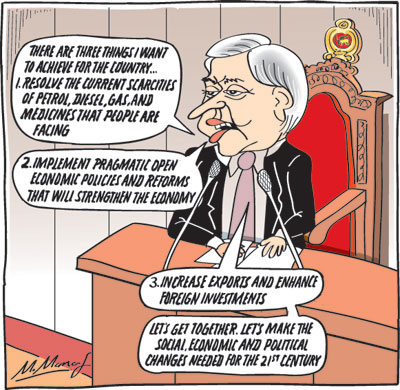Columns
President Wickremesinghe determined to address fundamental structural economic weaknesses
View(s):In his address to Parliament on Wednesday, President Wickremesinghe said he is determined to end the hardships people are facing and he said his mission and challenge was to resolve the fundamental structural economic weaknesses that have plagued the country for decades.
Vision
His vision for the country was to attain the status of a developed country by 2048: The centenary of the country’s independence.
Realistic pragmatic policies
The outstanding feature of his policy statement was his realistic assessment of the economic crisis. He analysed the deep-rooted causes for the underdevelopment of the economy and the proximate reasons for the current crisis and proposed pragmatic policies. He said pursuing pragmatic economic policies and undertaking economic reforms were vital to become a developed economy.
Inappropriate policies
President Wickremesinghe criticised the inappropriate policies pursued by successive governments and indicated some of the needed policy changes and structural reforms for economic growth.
The President was forthright in pointing out that the country had pursued inappropriate policies and kept debating on this.
“We have been debating for two or three decades on how our economic system should be. In 1977, a new economic regime was introduced to our country. However, we failed to modernise and adjust with time. Without focusing on the modernisation of the economy, we were engaged in competitive, short-sighted, and destructive narrow politics.”
He implied that subsequent governments had pandered to populist measured and deviated from sound economic policies and fiscal accountability.
“However, now people are aware of the losses incurred by the country due to corruption and fraud.”
Despite his candor, he failed to mention that root causes for the economic deterioration was the large scale corruption and foreign borrowing for inappropriate and uneconomic infrastructure development under the Rajapaksa regime. This was because of his political dependence on the Sri Lanka Podujana Peramuna (SLPP).
Anti-assistance
The President’s statement also pointed out in detail the “enormous loss caused to our country due to the opposition to foreign investments.” He cited several such instances.
Oil tanks
“When we tried to develop the oil tank complex in Trincomalee together with India, it was said Sri Lanka would be a sell out to India and this development project was halted. At that time if we were allowed to develop the oil tank complex, today people would not have to spend many days in queues for fuel.”
Ambulances
“Even when the ‘Suwasariya’ ambulance service was initiated, a similar objection was raised. Some doctors held media conferences stating that ‘if patients come to the hospital by the ‘Suwasariya’ ambulance service, deaths will occur’.”
Japanese aid
“When Japan offered to establish the Light Rail Transit (LRT) and develop the container terminal in the port, it was opposed by giving a number of baseless reasons. Therefore, our country lost more than US$ three billion in investments. Regrettably the traditional friendship between Japan and Sri Lanka has been adversely affected.”
This was a decision of the deposed President as soon as he assumed office.
MCC
Another instance was the Millennium Corporation Compact (MCC) that was virtually a gift of more than US$ 500 million.
Reforms
Three pillars of the President’s strategy are: Ensure law and order, get immediate international assistance, bridging finance from friendly countries and international organisations and enter into an International Monetary Fund(IMF) Extended Fund Facility (EFF) and undertake reforms that would stabilise the economy and lay the foundation for economic growth.
Challenges
These are three immense challenges. The repressive measures could be counterproductive and lead to widespread social unrest. They could also affect international assistance.
IMF
The bridging finance and an early agreement with the IMF are vital. Hopefully there would be lesser unrest and less political instability to obtain these and other bilateral aid from friendly countries and international organisations. The success of the consultations with the IMF and the debt restructuring plan are critically important for the economic recovery.
Concluding reflections
Are we at a tipping point in the economy? The answer to this is in the ability of the government to implement its programme. The response of Parliament to the President’s call to unite would be significant.
Even more significant was whether the recent social unrest would peter off the reduction in power cuts, improvement in the availability of gas and fuel may reduce popular discontent.
However, the President’s measures to contain protest could have a negative impact on law and order. The international response to issues of human rights violations would be of considerable significance as international financial assistance is indispensable for immediate relief and the economic recovery programme.
The earlier reaction of the United Nations Human Rights Commission (UNHCR), European Union (EU), the United States, Canada, Norway and Sweden were ominous.
At this point in time, the future of the country is uncertain though President Wickremesinghe’s address to Parliament spelled out a strategy for economic stability and economic recovery.
Buying or selling electronics has never been easier with the help of Hitad.lk! We, at Hitad.lk, hear your needs and endeavour to provide you with the perfect listings of electronics; because we have listings for nearly anything! Search for your favourite electronic items for sale on Hitad.lk today!


Leave a Reply
Post Comment